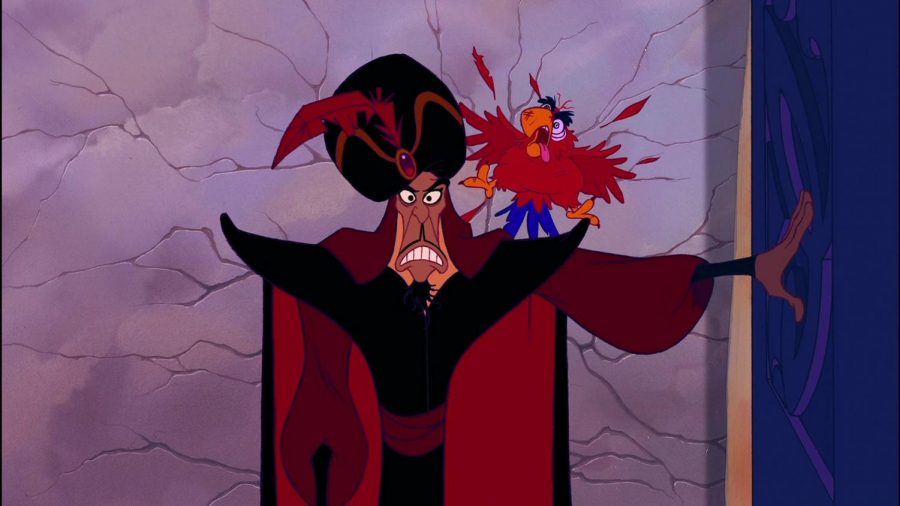Live-Action ‘Aladdin’ Controversy Casts Shadow on ‘Black Panther’
A scene from the 1992 Disney film Aladdin.
February 13, 2018
If you were ready to applaud Disney for its efforts towards casting minorities in “Black Panther” –– not so fast. Disney’s “Aladdin” live-action remake proves it still has a lot of room for improvement.
Kaushal Odedra is an extra in Disney’s upcoming live-action adaptation of the animated classic “Aladdin” directed by Guy Ritchie. After rejection from several roles, Odedra was finally awarded a spot in a film he thought would accurately depict diversity. However, he was shocked when he saw nearly 20 white extras being darkened to look more brown for a large sequence.
According to a statement from Disney in the Independent, “more than 400 of the 500 background performers were Indian, Middle Eastern, African, Mediterranean and Asian.” Disney resorted to using white extras because they faced difficulty in finding members of the Asian community having skills relating to stunts, dancing and camel handling.
Yet, the film is being shot in Longcross, an area of London that is home to over one million people of Indian, Pakistani, Bangladeshi and Arab heritage.
Ritchie’s “Aladdin” is not new to controversy. The studio reportedly delayed production because it had trouble casting its leads, having auditioned over 2,000 actors, as the parts required singing and dancing skills. Fans found it surprising that Disney claimed to have that much difficulty — the Indian film industry alone is dominated by musicals and many talented actors with international appeal — but the studio kept reassuring fans that it had to get the casting just right.
Given Disney’s stated goal of using one of the most diverse casts in film history, how is it that Disney could be so careless with a few background actors? Disney wasn’t unable to find the culturally appropriate extras –– they just got lazy. According to NYU students, the controversy is unsurprising but disappointing.
“It’s not that they don’t have the resources,” Tisch freshman Carolina Zeitune said. “When you take the easy way out, you’re not being thoughtful of other people’s cultures. It’s just gross.”
Sam Lowenburg, a freshman in Tisch studying Film and TV, relates to Zeitune.
“They’re trying to take the quick way out instead of the right way out,” Lowenburg said.
Representation matters on all fronts. From the protagonist to 100 extras, accurate casting is immensely important. Disney’s ignorance sends a painful message to Indian and Middle Eastern moviegoers that their screen presence —even on a minuscule level — can be considered irrelevant and replaceable in Hollywood.
Even more so, it implies that this notion has been normalized. When Odedra asked a Saudi extra about the issue, the latter responded with nonchalance.
“This is how the industry works,” the extra said. “And there’s no point complaining about it since it isn’t going to change.”
In a time of “Black Panther,” a Disney-produced film, audiences react when they see equal representation on screen. When minority audiences see people of color in strong complex roles that aren’t mired in stereotypes, they feel a sense of empowerment after years of white males dominating the screen. “Aladdin” was going to be one of those movies. However, the fact remains that there was an attempt to work around diversity, undermining the film’s potential to change the way in which films about people of Indian, Middle Eastern and Arab heritage are made. Prince Anders, an originally white character specifically created for the remake, has also garnered controversy. Many find his appearance to be extraneous. Without context, Anders seems like an attempt to keep a white presence in the film. The studio can taut its diversity, but its script and casting — as well as assembling a majority white background crew — shows otherwise.
The various decisions Disney has made on the “Aladdin” remake sets a dangerous precedent for what may come of the “Mulan” live action adaptation as well. Given the film industry’s recent progress towards inclusion, why should it be a risk — financially or creatively — to include a minority actor in any movie? “Aladdin” is another example that is long overdue to change what is considered the norm.
Email Guru Ramanathan at [email protected].




























































































































































